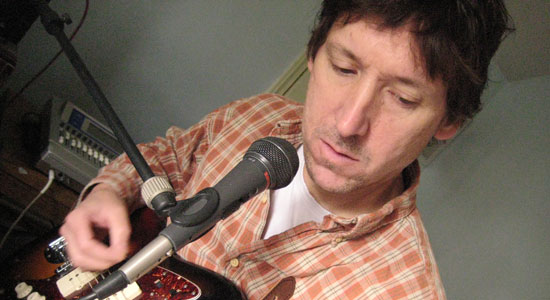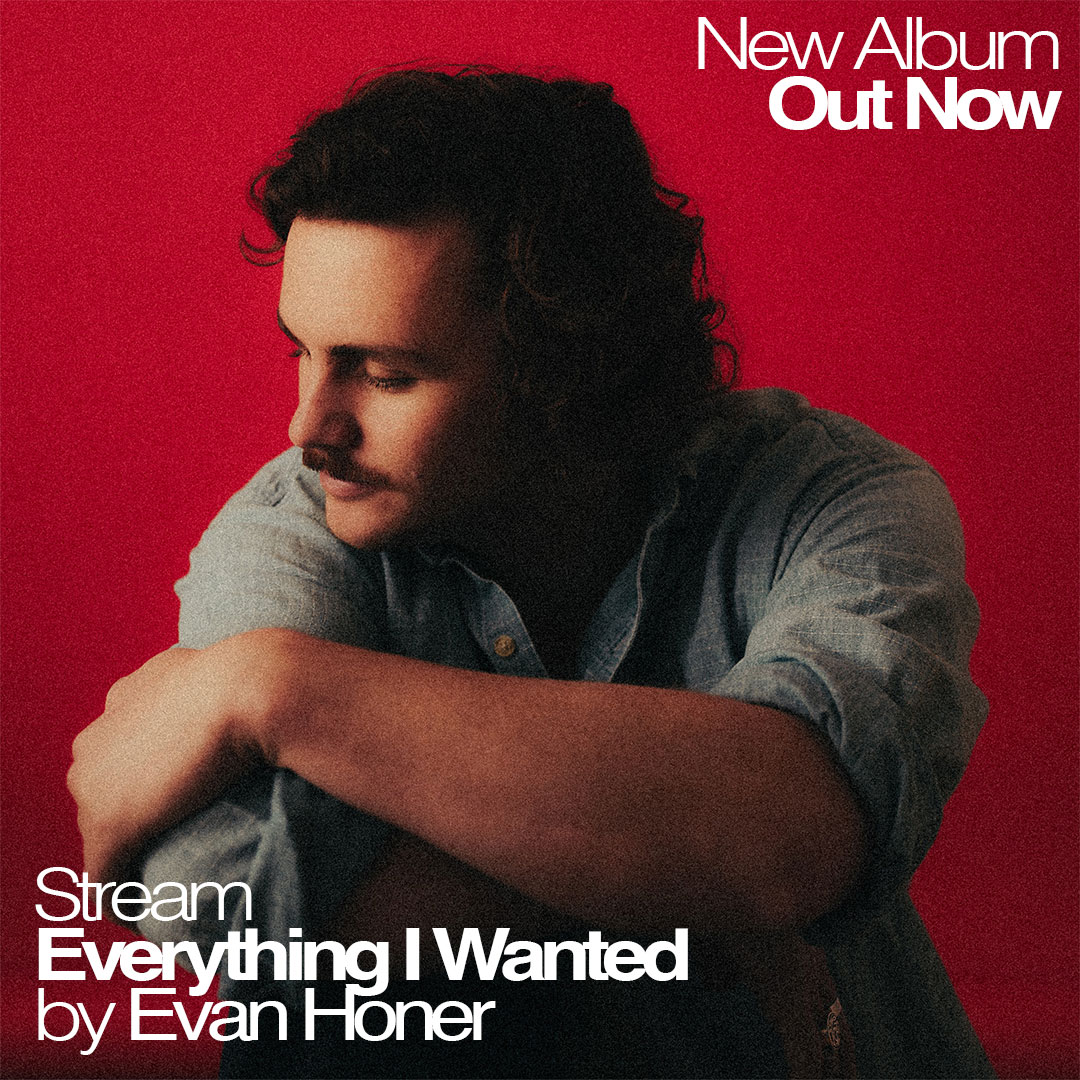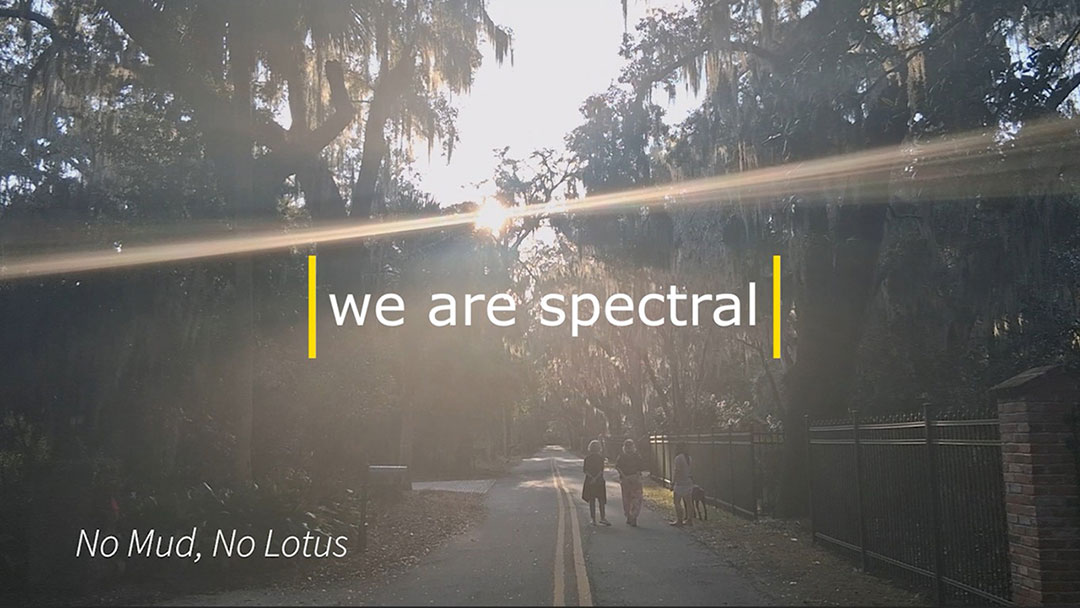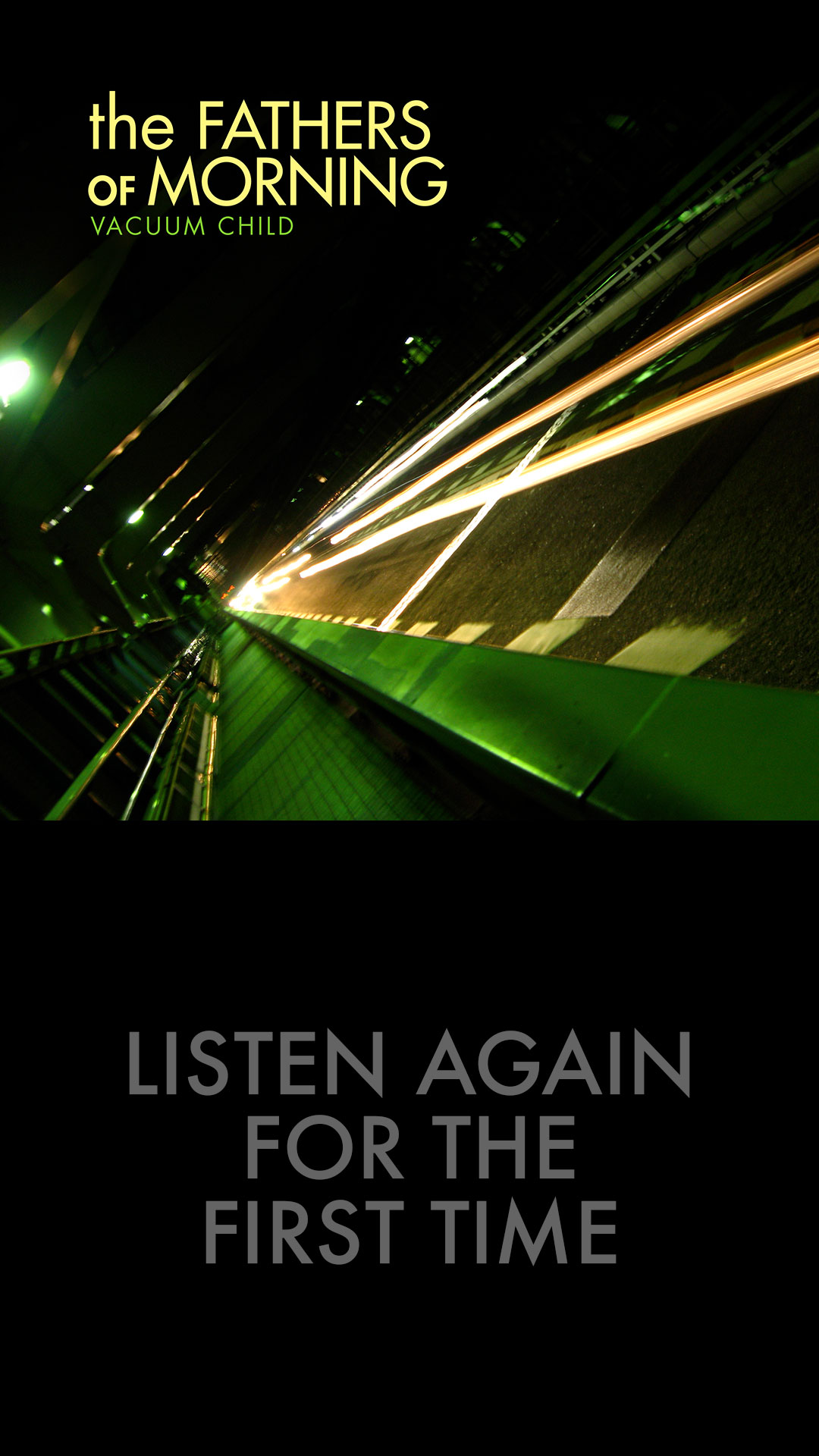
Stoutly refusing to record his passionate songs under anything less than his own terms (in his New Jersey home on a TASCAM MiniStudio), F.M. Cornog, under the name East River Pipe, has released seven albums since 1994 that can stand toe-to-toe with anything by your favorite indie rockers over the past 20 years. Although working full-time at the local Home Depot and raising a daughter with his wife may have curtailed Cornog’s recording time somewhat, the quality of the finished product remains unchanged. ERP’s latest, We Live In Rented Rooms (Merge), is further testimony to a man who refuses to play the rock-star game (form a band, tour, do photo shoots, etc.) and has come out the other side with a brilliant body of work—and with his soul intact. MAGNET recently caught up with Cornog by phone. Cornog will be guest editing magnetmagazine.com all week.
MAGNET: Your daughter was just a baby last time we did this, in 2003 for the Garbageheads On Endless Stun album. She must be old enough now to have developed her own musical tastes.
Cornog: Oh yeah. She’s eight now, and she’s listening to the usual suspects: Katy Perry, the Black Eyed Peas. It’s her music, and I let her indulge herself as long as it’s the relatively clean version.
How is fatherhood treating you?
It’s good. But this is why it’s taken so, so long to put out a record. When you have a kid, you can’t do whatever you used to do. I don’t want to feel guilty or have her harbor any resentment against me. Like, “Dad was always doing music up there in his room with his stupid mini studio. That was always more important than I was.” So I’ve kind of pulled a John Lennon house-husband thing. Although I’m still working at Home Depot, it’s turned the music thing into kinda like a guerilla-war operation. I kinda peck, peck, and then I run away. Then I come back and peck, peck, peck again. Plant a few explosives on the railway, blow ’em up, then retreat into the woods.
Well, at least the Nazis haven’t found you yet.
I used to have hours and hours and hours of uninterrupted time when I was in Queens and in the early years when I came out here, around the time of Gasoline Age. But ever since then I haven’t had those long, long periods of time. You know, I like to be present for my family, my wife and my daughter, and spend time with them. I still love doing the music, but it really comes, I would say, second or third now. Maybe when she gets older and gets sick of me and doesn’t want me around I can get back into it again.
I don’t want to scare you off, so I won’t bring up the specter of the teenage years with a daughter. I’ve been through that.
I look at it like we’re all caught up in this big river. You can control certain things, but people believe they have more control than they really have. I think you have to let it take you down the stream and see what happens. Maybe paddle furiously when certain things come up, but mostly I just go with it.
What does your daughter think of your music?
It’s funny what appeals to her. You think she’s not really listening. But she hears “I Wanna Be Sedated” by the Ramones and says, “Wow, that’s great.” She doesn’t know what it means, at least yet. She also loves the song “Rise” by Public Image Ltd. So, you never know what a kid will like.
My daughter has gotten a lot of mileage with the time I introduced her to Joey Ramone at an instore in San Jose in 1978 when they were signing copies of Ramones Leave Home. The import of shaking Joey’s hand was not lost upon her. He was very nice.
People may not know this about me, but the Ramones still remain the band I saw the most live. People probably think, “OK, East River Pipe, you probably saw … ” I don’t know that they think. Maybe Joy Division or some dreamy group, not too acidic. But the Ramones, they were constantly out there.
I usually think of them as the Beach Boys of their day. Terrific, melodic, rocking, short tunes. If you don’t like that one, try this one two minutes later.
Yeah, and I kinda dug their work ethic. If I was gonna be in a band … I’ve seen the documentaries, and it seems like they didn’t like each other very much. They weren’t the greatest musicians in the world, obviously, but they were very serious about what they were doing. It had a very Andy Kaufman-esque feeling to it. They only did one thing, but you knew you were gonna get it. When you buy a Big Mac in Manhattan, it’s gonna be the same as it is in Brazil.
Do you still have an aversion to playing live? You told me before you tried it a few times, didn’t like it. Even Jandek eventually succumbed to the urge to play live after decades of secrecy.
I was talking to this guy at work at Home Depot. And he’s always like, “Why can’t I meet the right girl?” I don’t know. Life pushes us from side to side. Sometimes, in a way, it’s kinda like roulette. You fire the gun enough, and maybe it’ll go off someday. Maybe it won’t. Maybe you’re shooting blanks. And that’s the way it’s always been with me and collaborators, or band people. I’d get a few practices under my belt, and it was always something like the drummer had a girlfriend and he had to leave practice. I’m like Johnny Ramone in that respect. I mean, you can’t do that. It’s almost like a church to me at that point. This thing has to be more important than your girlfriend.
Sure, the band’s gotta come first.
If it’s serious, I can understand. But if it’s just someone you met the other night at Kenny’s Castaways, that’s a whole another thing. So it’s partly that and it’s partly just my personality. I’ve always liked solitude. I’ve never rushed to be in a crowd or a gang of people. It’s the other way around. Gangs of people always made me walk the other way. My wife used to go to CMJ, and all these musicians seemed to think they’re different. Then you go to CMJ, and everybody looks the same: the same hair and accessories. I guess substance abuse played a role in that, back then. I’ve gotten so used to the way I operate now that I got fed up with waiting around for something to happen. The guitar player can’t practice that week.
You were the perfect customer for TASCAM.
The MiniStudio came about in the early ’80s. I kinda knew my ship had come in. “I’m gonna get one of those damn things and work in my room.” And it’s always been like that. It’s a combination of not really meeting the right person to spark off a nice collaborative thing, then getting used to working for years and years with this MiniStudio.
I really like the new record. Then again, I’ve liked all your records.
Thank you. It’s kind of a quiet little thing. I really can’t expect much from this record. It’s not really a big statement. It was like trying to keep the sharks from devouring all of your soul. Cutting your life clean from the general culture out there.
Do you still have any contact with Kurt Wagner of Lambchop? You guys were a nice fit, I thought.
Yeah, I ran into them when the Merge fest happened, the 20th anniversary of Merge Records. I didn’t play. I almost introduced Lambchop. My daughter actually got up onstage with the band Guv’ner and clapped a little. She has that drive to be out in the spotlight. I don’t know where she got that from. So yeah, I talked to Kurt for a long time down there. And we always have something out there, like, “Let’s maybe do a Lambchop/East River Pipe thing.” I’ll use Lambchop kinda like a backup band, and we’ll go out there. But of course, it’s me that’s backing out of that type of arrangement. Kurt couldn’t be more generous with the way he throws out invitations to me.
If you and Kurt and the boys played live, I would certainly fly out there to see it.
Well, if I was gonna have a backing band—and I hate to even call it a backing band—we’d have to rev it up a notch, I think. They would probably like it, because they’d have to get a little louder and a little more abrasive. They’d have to bring back that thing they had back in ’97, where there was this floating, menacing little rain cloud of dissonance behind everything they did, which I love.
Do you still have the same drive you had 20 years ago?
I’ve always had a drive to write good songs and record them here at home. And not in a way that was half-assed and “lo-fi.” It was not a drive to become famous or bang 17-year-old girls or to be adored. It was just a guy trying to write good songs. That was my drive in the beginning, and it still remains my main drive now. My father always said, “You have no ambition. Sooner or later, life’s gonna kick you in the ass. You’re like a Buddhist monk. You should move to Nepal and sit there and chant all day, bang a gong. Or play one note on a sitar.” He was frustrated by that. But you know the words you say to a kid kind of stay with you. In a way, he was right. These guys at work, they go on the internet and say, “Wow, there’s a lot of stuff here about East River Pipe. Why don’t you don’t you go out on the road and be a rock star?” You know, I’m lugging around tiles, lifting bags of grout and stocking shelves, talking to people about wood floors. I believe we all do the best with what we have. I’ve never had the type of personality that can get up onstage and sell myself from town to town. I’ve always used music as this thing that’s very private, in a way. I like to share it with people, but on my terms.
Jason Lytle of Grandaddy told me about European press-only tours he had to do, where he didn’t play a note, just went from stop to stop to do interviews, where they’d ask the same questions day after day. He said he got so tired of the process, sometimes he would just make stuff up.
Yeah, Kurt had to do that, too. It’s weird because you get into music to write music, to be creative. And talking about music isn’t doing music. My daughter’s always fascinated: “Wow, a guy’s gonna call you up today and you’re gonna talk about your music.” It always depends who’s calling you up. I just talked to a person on BBC4 who was screening me to see if I was worth talking to.
Wow, a pre-interview!
Yeah, and they didn’t know anything about me, not one thing. Not that they should know anything. But you could at least look it up on Wikipedia. I guess she’d read the press release for We Live In Rented Rooms, that Cornog writes about the dark side of American life, the lower rungs of American society, which I do. But that’s all she wanted to talk about. She wanted me to take a big bear-shit on top of American society. She wanted to push me in that direction, corral me into saying something. And I just wasn’t into it. I’m not particularly patriotic, but I’m not one of these anti-government survivalists who’s living in Idaho, either.
Did you have a little family party when the album was finally finished?
No. [Laughs] I was at work that day. This was a really difficult album because I could never get up a head of steam. It was peck, peck, peck, retreat. It was like Chinese water torture, a woodpecker trying to bring down a gigantic oak. It’s a quiet little record. I’m expecting it, in some quarters, to get completely ragged on. It isn’t anything more than a guy recording these little songs without any gigantic themes.
Do you read your own press?
My wife kinda shields me. I try not to, because if it’s good, you go, “Wow, that guy really got it.” But if it’s bad, you go, “Wow, that guy’s really an asshole.” Even though he, too, might have gotten it. If you swallow the good, you have to swallow the bad. I believe you should not seal yourself off from life itself. You should just do your thing and see what happens. In my whole if you want to call it a career, it’s about trying to stay clear of all that crap. For years after I put out my first couple of records, when these major labels were coming at me … and I eventually signed with EMI, however briefly.
Yeah, I recall you got a five-album lump-sum settlement when EMI America went out of business.
Yeah, pretty good, huh? Bought a house. These record people were telling me, “You’ve gotta go into a real studio. You have to tour. And if you’re really going to stay in your TASCAM MiniStudio environment, you’ve gotta get a new mic, and it has to be at least a Shure SM57.” They were always dictating to me what I could do, should do. And I said, “Fuck this.” The only reason I took the EMI deal was because they said, “Do whatever you want to do. Just drop a master recording through our door every year and a half, and we’re cool with that. Here’s this money. You don’t have to tour, you don’t have to do any photo shoots, any interviews. You don’t have to do anything.” I didn’t even have to get a day job. If I had that situation now, I could put out an album every six months, like Elton John in the ’70s.
Since we last talked, one of your songs has been covered by David Byrne. How did that come about, any idea?
Yeah, David Byrne did a tune from my most maligned record, Garbageheads On Endless Stun. He ended up recording a song called “Girls On The Freeway” in a semi-country way. I mean, David Byrne—I listened to this guy’s records all the time! That was amazing. I shook Kurt down, because David Byrne has also covered a Lambchop song. Because Kurt sometimes talks to David Byrne, I asked Kurt if he turned him on to the song. I mean, how could David Byrne find anything that I do? And Kurt said, “Look this is David Byrne. He can do whatever the fuck he wants to. I had nothing to do with it.” When the guys at Home Depot ask if somebody has done one of my songs, and I mention David Byrne, that’s something they understand. I made a best-of list in the New York Times a few years ago, and my father went, “Wow, the New York Times.” Up until then, nothing meant anything. With David Byrne, a lot of Home Depot people have heard of the Talking Heads. “OK, this guy must be half decent if David Byrne covered one of his songs.” Mention Lambchop to somebody at Home Depot, and they’d think it was a sock puppet.
—Jud Cost
“Cold Ground” (download):















2 replies on “A Conversation With East River Pipe”
East River Pipe is one of my favorite bands. The reason I like Cornog’s music so much is that it’s consistently great. There are no songs on any of his albums that sound like they were put in as filler. He doesn’t aim for “hits’ in the traditional sense, though many of his songs could easily become hits if they were ever played on the radio. The first East River Pipe songs I ever heard was “Make a Deal With the City” from “Shining Hours in a Can.” After hearing that song I bought every ERP album available. After listening to “We Live in Rented Rooms” just once I know that despite the fairly long hiatus, Cornog’s songcraft skills have not diminished one bit. It’s hard to believe these songs were recorded on a Tascam MiniStudio, but it does give hope to the many bedroom-recording-studio artists out there. Thanks for the interview Mr. Cornog and good luck with the new record.
>>.M. Cornog…albums…that can stand toe-to-toe with anything by your favorite indie rockers over the past 20 years.<<
Um, no. His music is poorly produced R. Stevie Moore light.